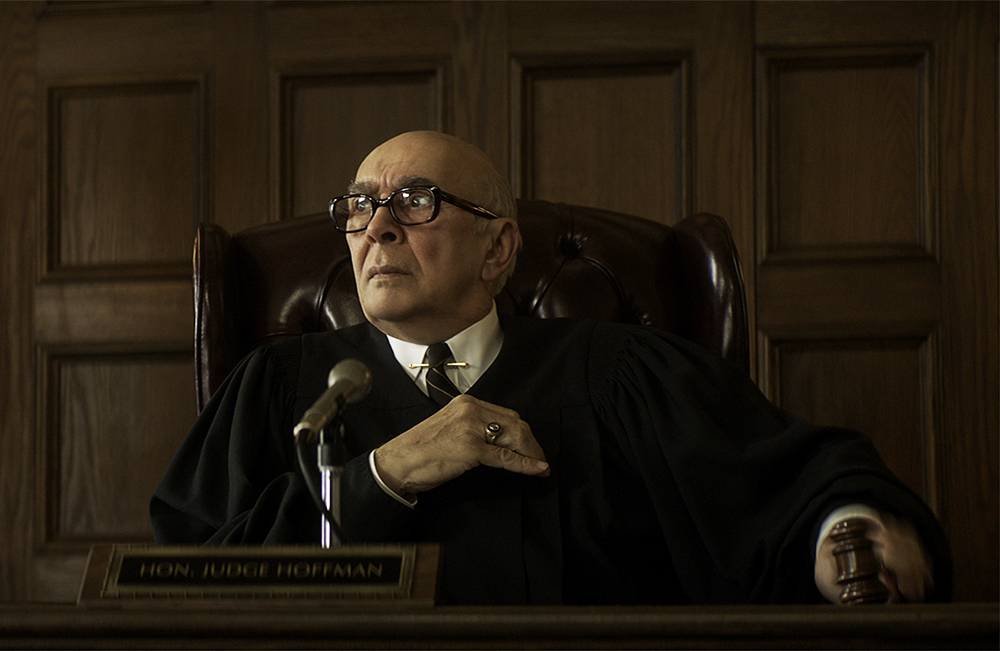Historical events need each generation; not only do they teach us about the past, but they give us a much-needed reality check on our lives. Cinema has often used stories related to historical events in documentary, short, and full feature-length films. We have seen such films that talk about the unspoken reality of history and injustice and the brutality that often follows. Many filmmakers have visually used this context from a dramatic to the most realistic way. A recently premiered film, “The Trial of the Chicago 7,” also centers on the real-life-based important event of United States history.
The story of the film is set in 1968 in Chicago, and a peaceful demonstration against the ongoing Vietnam War. There are many people among the protesters such as Tom Hayden (Eddie Redmayne) and Rennie Davis (Alex Sharp), who support peaceful protests for the young people that lost their lives in the war. Then there are family-guys like David Dellinger (John Carroll Lynch) and the militant leader of the Black Panthers Bobby Seale (Yahya Abdul-Mateen II). Yippy Abbie Hoffman (Sacha Baron Cohen) and Jerry Rubin (Jeremy Strong) have a chaotic protest approach. But somehow, what meant to be a non-violent act of opposition takes an ugly turn, causing a riot between police and protesters; we see tear gas and rifles in short time.
State Government decides to voice an anti-protester moment; they charge seven demonstrators with conspiracy to incite a riot. The Attorney General John Mitchell (John Doman) has pre-decided that this event is responsible for the unrest. He assigns the case to Richard Schultz (Joseph Gordon-Levitt) and Thomas Foran (J.C. MacKenzie). As the trail begins, it signals on the chips stacked against the seven, and prosecutors wanting them to be found guilty, whatever it takes. The judge of the trial is Julius Hoffman (Frank Langella), a man who shuffles on that wild brink between inept and wicked. William Kunstler (Mark Rylance) is a defense attorney for the seven. The story mostly stays in the courtroom and sporadically shifts to the outer world. As the story unfolds, seven people with different beliefs—and the organizations fighting against the bias system— they want to make an example.
The film is based on a real-life event; it is directed and written by critically acclaimed filmmaker Aaron Sorkin. He starts the story a few months after the historic Chicago 8 event. Sorkin’s narrative focuses on the function of government hindrance that is vigorous in its regulating apparatus, police power, and judiciary structure. The displeasing outcomes of the opposition’s repression are close when the U.S. was in a metamorphosis from Lyndon Johnson to Richard Nixon. The script is neat, bold, and finely balanced, which is filled with niceties.

The story boldly showcases police cruelty, an unforgiving legal system, and the liability lines splitting those grapples into an autocratic regime. The screenplay modifies accurate details to edge the courtroom drama that engrosses the 1960s; it does not fear questioning the system and our conscience. The misuse of center power people and racism is shown in relevant conversion. The films’ dialogue is magnificently written: it’s almost a 52 year-old-event, yet the conversations make it realistic and relevant in today’s time; Sorkin fictionalizes a bit, but does not go away from the main points. He smartly randomly includes actual life footage from the riots of 1968 and uses words to visualize and exhibit the historically important event.
What makes “The Trial of the Chicago 7” primarily remarkable is the cast of the film; it’s one of those stories where each character shines in its way. Eddie Redmayne, as Tom Hayden, is pitch-perfect. We can see from the beginning, he gets into the ideology of the role that shows throughout the film, as well as Alex Sharp as Rennie Davis. Yahya Abdul-Mateen II, as the Black Panther’s leader Bobby Seale, is excellent and showcases his emotion perfectly. Mark Rylance, as lawyer William Kunstler and Frank Langella as Julius Hoffman, deliver dialogues very well, again proveing their exceptional skills. But what I loved the most is the performance of Sacha Baron Cohen as Abbie Hoffman. He has personified the real-life protagonist so well that every scene recreates the authentic look at the original. The rest of the cast, like Jeremy Strong, Joseph Gordon-Levitt, J.C. MacKenzie, John Doman, and Michael Keaton, are equally performed.
The film takes viewers to an actual event in the history of Freedom of Speech, the ability to protest, and the right to question the government’s most fundamental actions. The layering between the 1968 Chicago protests and recent Black Lives Matter protests are all manifest. The story also focuses on free minded-people who get treated as a threat to society. The movie reminds one of the rights to freedom and the consequences it can cause to one’s life.
“The Trial of the Chicago 7” is a must-watch story today, especially when the applicability of how history is, in turn, continual by its very nature. It not only has a predominantly astonishing story by Aaron Sorkin but also has the master class performance of the entire cast. The film leaves an important message that everyone in today’s times should understand. You can check out this film now on Netflix.